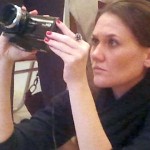
In the didactic installation
the absolute necessity of using aesthetic tools for the teaching and the studying of the body and of the formulation, as well, of an anatomy opened to mutation, its actions, its power, its multiple environments, its networks, its processes of subjectivation.
Leia Mais »Self-Knowledge is a Dangerous Idea
an interview with Regina Favre, published by Elephant Journal back in 2011
Leia Mais »Corp.Ante.Corpo
Regina and I – short hair with blond highlights, sweet bangs, bobby-pins on either side, a scarf around her neck and a challenge: maturing. We enter the room where she sees patients. I pull an iPhone 3 out of my bag, get the recorder ready, and place the phone on a stool, next to Regina. […]
Leia Mais »The Embarrassed Ballerina
How students are using the formative process device
Leia Mais »Ten embodied conversations
Following the protagonizations of a student throughout his formative education.
Leia Mais »Halfway – a clinical study
Several reasons led me to choose this case to present at this meeting. But perhaps the most important of these is the fact that we started together, George and I, 4 years ago, each one in his own parallel, a great effort of singularization: me in my clinic, he in his life. Two weeks […]
Leia Mais »Subjective Biodiversity
Regina Favre * Concepts and practices are historical devices. I believe that practices and knowledge of the body, as they are currently conceived, have their roots in mid-nineteenth century Europe, and are a byproduct of the industrial society. The transition from craft production to industrial production completely remodeled artistic and cultural traditions, conceptions of […]
Leia Mais »A conceptual device for honoring and enhancing subjective biodiversity: a political way of teaching and experiencing Stanley Keleman´s Emotional Anatomy.
Regina Favre, Laboratório do Processo Formativo, São Paulo, Brazil Concepts and practices are part of a cultural history The body knowledge and practices are part of our history. I believe that this knowledge, as we conceive them today, are rooted in Europe, in the mid-19th century, as a byproduct of the industrial society. The […]
Leia Mais »Regina and Rogerio: fragments of a fifteen year conversation
As I started the study and translation of Keleman’s books, in 1990, I felt immediately the need to understanding the evolutionary roots of his formative and unique conception of the body. Rogerio Sawaya was already at the time a very experienced medical doctor, an obstetrician, introducer of the Leboyer Birth Method in Brazil , son […]
Leia Mais »Ten embodied conversations
Following the protagonizations of a student throughout his formative education. 0. A dispositive In the seminars at the Laboratório do Processo Formativo we study how bodies produce themselves and in the same act continually produce environments. Many actions compose the strategy through which we plunge into this evidence. In the room, there is a […]
Leia Mais »